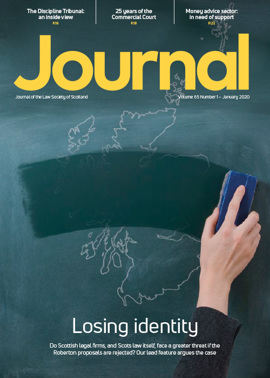Regime change for planning fees

As part of Scottish Government (SG) improvements to the planning system, it published a consultation on “Planning performance and fees” in December. The deadline for responding is 14 February 2020.
Building on the enactment of the Planning (Scotland) Act 2019 to improve the efficiency and effectiveness of the system, the consultation foreshadows significant changes to the planning fee structure, intended to be in place by mid-2020. It proposes a new approach to measuring performance, and a new fee regime. It includes substantial increases in fees and the introduction of additional services that may be charged for, with the ability to waive or reduce planning fees.
The consultation will be of particular interest to planning authorities and developers. The ministerial foreword states that increases to planning fees must be matched by continuing improvements in performance. The independent panel appointed by ministers to review the planning system examined both of these issues, and recommended in 2016 that fees for major applications should be increased substantially so that the service moves towards full recovery, but linked to improved performance, and that scope for increased discretionary charging be considered further.
In 2017 the maximum planning fee was increased to £125,000. This provided an additional £4 million to planning authorities. Research undertaken by the Royal Town Planning Institute in 2019 indicates that the additional cost to planning authorities over 10 years for implementing the 49 new duties under the 2019 Act (introduced by amendment at stage 3 of the bill) could be between £12 million and £59.1 million. The consultation indicates that it is not the role of fees to address these new duties unless the duties relate to determining an application; and observes that fees currently only account for 63% on average of the costs of determination.
Measuring performance
Section 46 of the 2019 Act places annual performance reporting on a statutory footing. Section 47 (now in force) enables ministers to appoint a coordinator, sitting within SG and ultimately reporting to ministers, to monitor performance by planning authorities and provide advice. In terms of monitoring, SG intends to build on the Planning Performance Framework established in 2011-12 by the Heads of Planning Scotland. SG’s expectation is that these reports will cover statistics; customer service; engagement; case studies; outcomes; improvement and resources.
Planning fees
The consultation stresses the linking of fees to performance. It is important to observe that the Act does not contain any equivalent enforcement provisions similar to those introduced in England & Wales, which enable poorly performing authorities to be put into “special measures”, providing applicants with the option of submitting applications directly to the Secretary of State. The independent panel was opposed to this. The link arises from ministers’ clear expectation that the planning system is reliable, proportionate and provides a service focused on delivery and continuous improvement. It is stated that resourcing is the responsibility of local authorities.
The new fee structure sets out a number of categories of development, including:
Category 1: Residential development. Increases are proposed, with developments being subject to a maximum fee of £150,000, up from the current £125,000. Applications for single houses and up to 10 houses are subject to a 50% increase.
Categories 2-5: Extensions and alterations to existing houses. An application to enlarge an existing dwelling will be increased to £300. Replacement of sheds, fences, garages and micro-generation equipment will carry a fee of £150.
Category 6: Retail and leisure, including extensions. Such applications are considered complex and can involve retail and traffic impacts. The new fees are calculated by reference to floor space; increases are proposed from 20-70% depending on scale. Developments of 50,000m2 will be increased from a maximum of £125,000 to £150,000 (a 20% increase).
Category 7: Business and commercial extensions. This covers developments that are not residential, agricultural, retail or leisure. The new fees are calculated by reference to floor space, ranging from 20% decrease to 26% increase, depending on scale. The maximum fee again rises to £150,000.
Category 11: Wind farms and access tracks. This is a new category. Where three or fewer turbines are to be installed, each turbine below 15m will attract a fee of £500; any turbine of 15-50m a fee of £1,500, and any turbine over 50m £5,000. Wind farms totalling four or more turbines will be charged at £500 per 0.1ha up to a maximum fee of £150,000.
Category 12: Hydro schemes. This is a new category. Proposed fees rise from £401 per 0.1ha (maximum £20,055) to £500 per 0.1ha (maximum £25,000).
Category 13: Other energy. This is a new category and includes solar farms. The first 100m2 of site/floor space to be created will be £1,000, with £500 for every 100m2 thereafter, to a maximum fee of £150,000.
Another category of note is s 42 applications, which will increase from £202 to £300.
Discretionary charging
The consultation acknowledges that discretionary charging for pre-application discussions has been undertaken on an informal basis over a number of years at Highland, Fife, West Lothian and Edinburgh City Council and has on the whole been well received. Views are sought on charging for non-material variations and monitoring and discharge of conditions, which can be burdensome on a planning authority. The question is also asked whether planning authorities should be able to charge for planning agreements.
SG is interested in a more corporate project management role being taken for major developments and seeks views on a fee category for an enhanced project management service.
Appeals and local reviews
The 2019 Act allows ministers to charge for carrying out their functions, including appeals. It is stated that appellants enjoy the benefit of an appeal right where the planning merits are considered afresh by an independent decision maker, the costs being borne by the taxpayer. SG clearly supports charging for appeals, but seeks views on the level of fee and the basis for charging. A phasing in of fee levels is anticipated, starting at a modest level but moving over time to full recovery. Three options are set out: a percentage of the application fee; a standard fee set by type/category or hierarchy; or a flat rate for all appeals. Applications for a local review should not be omitted from feeing arrangements, as this would be inconsistent and lead to fairness issues.







